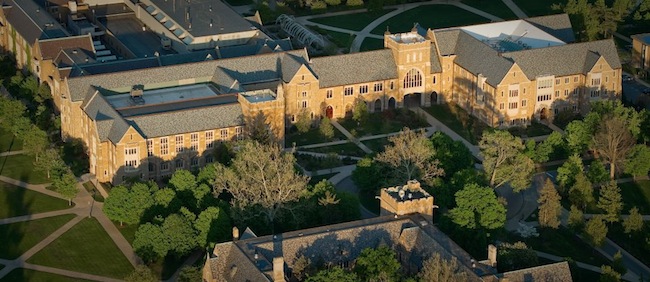
Notre Dame Law School
Notre Dame Law “Auctions Off” Admitted Seats
Law schools are seeing a huge spike in applications. Applicants are up nearly 20% compared to this March of last year and up 16.8% compared to two years ago.
At the University of Notre Dame Law School, demand for available seats ran high as the law school told admitted students to place deposits before spots ran out. On Tuesday, seats filled up in a matter of hours, Above The Law reports.
OVER-ADMITTED
With the influx of applicants this year, Notre Dame is one of the first law schools to have to deal with potentially over-admitting its incoming class.
While the deadline for deposits was April 15, the university officially stated that if it reached its maximum number of $600 deposits, it would waitlist the rest of admitted students. Within six hours after the announcement, however, the law school told applicants that they had reached max capacity.
“We have now reached our target number of deposits,” the email states. “We have turned off our deposit forms to ensure that we do not overenroll.”
DEPOSIT CREATES HURDLE FOR LOW INCOME APPLICANTS
While deposits are standard practice to saving an admissions seat, the unexpected, auction-like race to fill seats at Notre Dame may have unfairly favored more wealthy applicants with deposits readily available.
“For lower-income applicants, especially applicants who may be tapped out financially from LSAT preparation, exam fees, and school application fees, the deposit (and in some cases a second deposit) is just one more hurdle,” Kyle McEntee, executive director of Law School Transparency, writes for Above The Law. “You can’t pay your law school seat deposit from loans or scholarship money.”
Students say situations, like the one at Notre Dame, only make things more difficult for the underrepresented.
“This process is incredibly difficult for people of low income, for marginalized people, for people of color. I think situations like this, while accidental and unprecedented, only exacerbate how difficult it is for people to attend higher education and penetrate the legal field,” an anonymous students tells Inside Higher Ed. “Institutions can be a driving force of societal and systemic change, but when they act in this way and they show complete disregard for students who can help them make those changes, it really shows where their priorities lie.”
Sources: Above The Law, Inside Higher Ed , ABA Journal

Questions about this article? Email us or leave a comment below.